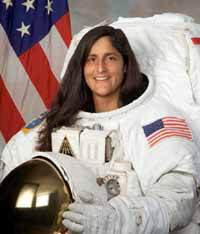Astronaut Suni Williams to run 210 miles in space
Zooming through low-Earth orbit at 17,500 mph (28,162 kph), Suni Williams completes the standard marathon distance every 5.4 seconds.

But for next month's Boston Marathon, the U.S. Navy commander will run the equivalent distance on a treadmill - 210 miles (338 kilometers) above Earth in the international space station, and tethered to her track by bungee cords so she does not float away.
"She thought it would be cool if she gave it a try," said Williams' sister, Dina Pandya, who will run the race the traditional way with almost 24,000 other runners. "She said, 'I'll call you on Heartbreak Hill."'
Although the world's oldest annual marathon starts at 10 a.m. EDT (1400 GMT) on Earth, Williams might not be able to run at that time because her sleep schedule - a fairly arbitrary matter in space - is set for the arrival of a Soyuz mission.
"I'm not sure the timing will be that she'll be awake," Pandya said. "They're going to be on Russian time, so they're kind of sleep-shifting."
Williams, 41, qualified for the Boston race by finishing last January's Houston Marathon in 3 hours, 29 minutes, 57 seconds. On Dec. 9, Williams took off on the space shuttle Discovery and it became clear she was not going to make it to the starting line.
"I considered it a huge honor to qualify, and I didn't want my qualification to expire without giving it a shot," Williams told the Boston Athletic Association, which organizes the race.
The BAA offered to send an official entrant's bib and a special finisher's medal - made without lead, per NASA orders - to the space station. But when this month's launch of the shuttle Atlantis was postponed, Williams had to be e-mailed a bib that she can print out; the other souvenirs will have to wait.
Race organizers have cooperated with far-flung endeavors like the "Boston Marathon in Iraq," sending extensive packages of trophies, water bottles and even a finish line tape to the Middle East for three years running. A similar shipment is headed for Kosovo this year.
But this is the first race they have ever had on a satellite.
"The Boston Marathon is the pinnacle achievement for most runners," BAA spokesman Jack Fleming said. "For Suni to choose to run the 26.2 miles (42.2 kilometers) in space on Patriots Day is really a tribute to the thousands of marathoners who are running here on Earth. She is pioneering a new frontier in running and in sports with her run, which will truly be out of this world."
Williams has run a handful of marathons, and she went through rigorous testing before being blasted into orbit. But three months with little gravity takes a toll on a human, and NASA requires all members of a station crew to exercise on the treadmill, a stationary bike and a resistance machine to maintain bone density and muscle mass.
"In microgravity, both of these things start to go away because we don't use our legs to walk around and don't need the bones and muscles to hold us up under the force of gravity," Williams told the BAA.
A "vibration isolation system" built by a NASA engineer will keep her from shaking the entire space station as she runs, but the machinery puts a strain on the runner's hips and shoulders.
Running a marathon is a strain under normal conditions: the first person who ran one, according to Greek legend, dropped dead when he finished. Since then, thousands of runners have sought refuge from on-course aid stations and finish line medical tents to be treated for hypothermia and dehydration, blisters and broken bones and heart attacks.
"That harness gets hard on her back and her shoulders or her hips. Her foot was going numb because the strap was on her hip so much," Pandya said.
"She realizes that she has to be OK (after she's finished). She mentioned the other day, 'There's no hot bath."'
Subscribe to Pravda.Ru Telegram channel, Facebook, RSS!




